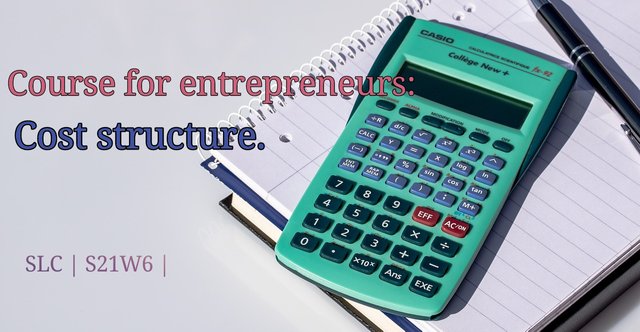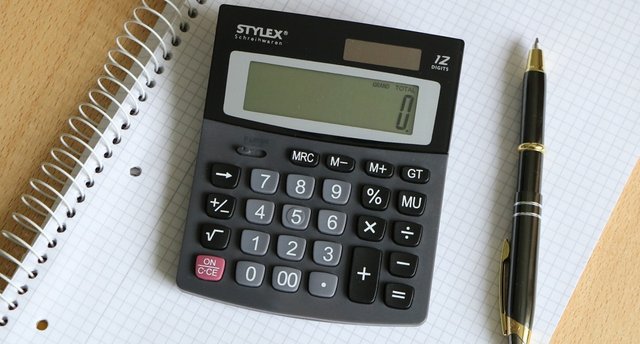SLC | S21W6 | Course for entrepreneurs - Cost structure.
Greetings to you, dear ones! This week on the Steemit learning challenge, I am participating in an entrepreneurial course in cost structure. Engaging with this topic was daunting at first, but I had to brave it. I will simply do my best.
Before I begin, I am inviting @esthyfashion, @goodybest and @bela90 to participate in this great learning adventure.
What is a cost structure, and what is its importance for entrepreneurship?
Cost structure refers to a systematic organisation and analysis of the deferent types of expenses incurred by a business, with the goal of enhancing financial management and strategic decision-making. It encompasses various dimensions, including cost categorisation, proportionate analysis, product/service offerings, management methodologies, and customer-centric approaches, ultimately facilitating optimised resource allocation and improved business performance.
Among the types of cost structure, we have:
- Fixed Costs
- Variable Costs
- Semi-Variable Costs
Importance of Cost Structure
Understanding a company's cost structure will help the company set its pricing to ensure profitability. It will also help the business to take care of cost control by identifying areas of high costs so the business can introduce and implement any cost-saving measures.
Having the proper understanding of cost structure will help an entrepreneur to make better informed decisions in the area of investments and the allocation of limited resources.
Being able to analysing the cost structure of a competitor can provide insights into their pricing strategies and operational efficiency.
Provide examples of businesses that use the cost structure methods explained; Reason your answers.
Cost-Driven
Most businesses with running a cost-driven structure will often want to minimise their expenses and maximise profits, it is especially so when they are running a strict budget. Examples of such businesses are Walmart, FedEx and McDonald's who are highly competitive often focuses their attention on reducing costs and improving efficiency.
Value-Driven
Businesses like health care providers, luxury hotels, or luxury brands like Louis Vuitton and Pfizer often use a value-driven cost structure which focuses on creating value for customers and stakeholders while managing costs. Businesses with a value-driven structure prioritise delivering high-quality products or services that meets their customer needs.
What are the elements of a cost structure? Provide examples,
Fixed Costs
Fixed costs are those expenditure that will always remain the same even if a company's production or sales volume changes. These costs are typically necessary to maintain a business's day to day operations and are often incurred regularly regardless of the company's activity level.
A good example of some fixed costs are salaries and wages will have to be paid regardless of the state of production of the company.
The same applies to rent and utility bills; if you are not making revenue, you will still pay rent, your tools and equipment will still depreciate, and your existing loans will still have to be paid.
Variable Costs
Variable costs are expenses that are directly proportional to the production or sales volume of a company's products. These costs increase or decrease in proportion to changes in the company's activity level.
Examples of variable costs are raw materials and supplies. The more you produce, the more raw materials you will have to spend on. The more you will have to spend on direct labour costs.
Less work will mean less cost of fuel, and more work will mean spending more on fuel. Energy, supply, and transportation are directly proportional to our activities.
Semi-Variable Costs
Semi-variable costs is often referred to as mixed costs, are those expenses that have both fixed and variable components. These costs will remain fixed up to a point, but then increase as the activity level increases.
Examples of semi-variable costs are utility bills for electricity, water, or gas. While there may be a fixed charge for these utilities, the cost increases as production or activity levels rise.
The cost of maintenance may remain stable, but once you overuse your equipment, the cost of maintenance will jump through the roof.
Prepare the cost structure of a cake making business. It has a production of 5 cakes a day and expects to obtain a total profit margin of 25%.
This is the raw materials table for the production of cupcake
| Ingredient | Unit | Unit Cost | Performance. | Actual Unit Cost | Serving size | Serving Cost |
|---|---|---|---|---|---|---|
| Flour | kg | 5000 | 100% | 5000 | 1000kg | 1000 |
| Sugar | kg | 600 | 100% | 600 | 120kg | 1200 |
| Eggs | crate | 5000 | 50% | 2500 | 3 | 500 |
| Butter | g | 200 | 100% | 200 | 40g | 40 |
| Leavening | g | 200 | 30% | 60 | 12g | 12 |
| Salt | g | 150 | 20% | 30 | 6g | 6 |
| Flavoring | ml | 100 | 50% | 50 | 10ml | 10 |
| Frosting | g | 500 | 100% | 500 | 100g | 100 |
| Total | 2,868 |
After taking an analytical look at the cost of all the ingredients that was used in making the 5 cakes, it is estimated that each of the cake is made with ingredents amounting to 2,868
In a month of 26 days at a rate of 5 per day, I should make a total of 130 cakes per month.
| Type of expense | Total monthly cost | Number of monthly units | Unit Shared Cost |
|---|---|---|---|
| Personnel | 15000 | 130 | 115.4 |
| Local | 5000 | 130 | 38.5 |
| Other expenses | 12000 | 130 | 92.3 |
| Subtotal | 32000 | ||
| Total cost per serving | 246.2 |
| Production Cost = | 2868 |
| Shared Cost = | 246.2 |
| Breakeven price for each cake | 3114.3 |
To calculate the selling price of a cake with a 25% profit margin:
One cake = 3114.3
Profit margin
= 25% of 3114.3
= 0.25 x 3114.3
= 15.5715
25% Profit Margin per cake
= 3114.3 + 15.5715
= 3129.9
Thank you for this beautiful opportunity to learn and get better informed. It took plenty of brain wracking to figure some things out, but at the end of the process I have come to learn a lot concerning the process of getting the best price for a product and service.
Calculating shared cost was the highlight, and another important thing I got clarified was performance and actual unit cost. I may buy 1 kg of sugar and use only 5% of the sugar I bought. This lesson has shown me how to take that into consideration. Thank you very much.
I really hope to see more of your lessons in the next season.


Thank you so much for breaking it down in details the types of cost we have in terms of fixed and variable costs
Greetings @udyliciouz
1.- You have shared the concept and importance of the cost structure, which allows us to visualize the profitability of the business and maintain control of finances.
2.- You have mentioned two acceptable examples of businesses that fit the cost structure methods, each with strategies according to the objectives set.
3.- You have mentioned the elements of a cost structure, along with their respective examples. Each of the costs plays an important role in the development of a company.
4.- You have developed the proposed exercise in an acceptable manner, showing it through an easy-to-analyze calculation table.
Thanks for joining the contest
Thank you so much for the verification